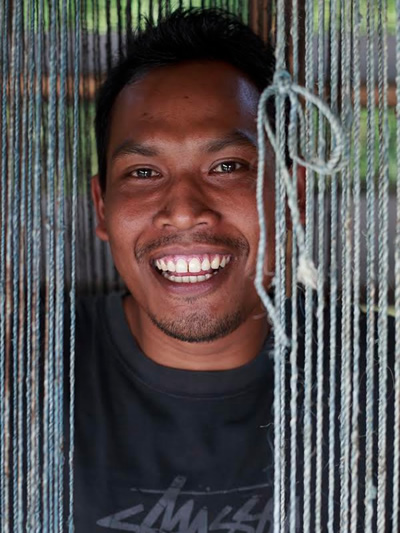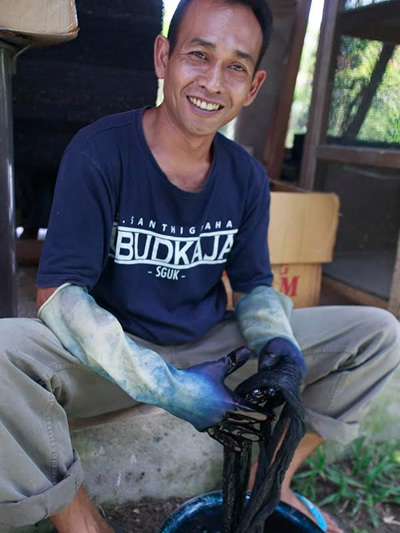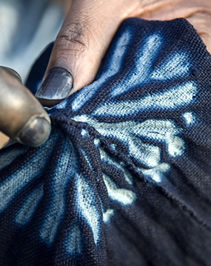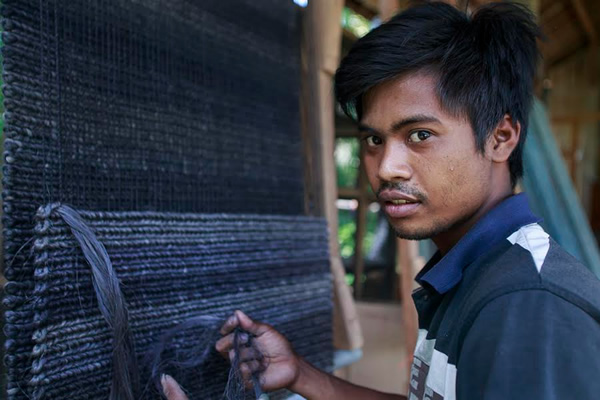The Living Blue with Aboubakar Fofana and Threads of Life
27th February to 10th March 2017
A 12-day indigo fermentation workshop combining the colour and wisdom of Mali and Indonesia for a unique small-group intensive experience (space limited to 8 participants) at the Threads of Life dye studio and botanical garden in Umajati Retreat, Ubud, Bali



Workshop teacher Aboubakar Fofana (image by Sandy Haessner), Threads of Life dyers Komang Sujata (left), and Wayan Sukadana (right)
Aboubakar Fofana describes an indigo vat as “a living organism” of plant materials, fermentation and colour, and is recognised as one of the world's foremost practitioners of fermented indigo vat dyeing and mineral mud-dye techniques. This intensive 12-day workshop focusses on Aboubakar's speciality, the fermented West African indigo dye-vat, made using the whole indigo leaves and fermented over a week to produce a dye of unmatchable colour and fastness. Whilst participants wait for the fermented dye-vat to reach maturity, they will learn other dye processes, including powdered fructose (quick vat) indigo, mineral mud-dye, and a host of other colours from madder, cochineal, weld, walnut, catechu (cutch) and oak gall, offering a comprehensive introduction to dyeing with natural dyes for beginners and further insight for those seeking to extend their repertoire and techniques.
Threads of Life’s dye team will also contribute to the program and will offer: dyeing with fresh indigo (Indigofera tinctoria, I. suffruticosa, Strobilanthes cusia) from the dye garden as a contrast to the fermented and fructose vats; use of sustainably sourced Ceriops dyes that form the basis of the brown in Central Javanese batik; and an exploration of Indonesia’s indigenous red dye from the root bark of Morinda citrifolia, including preparation for the 2-month oiling process, and use of the Symplocos plant-based alum mordant (which Aboubakar will also experiment with). Being essentially yarn dyers, the Threads of Life team’s participation will contribute to the conversation as Aboubakar leads an examination of techniques for successful yarn dyeing.
Using the indigos from the Threads of Life garden, Aboubakar will also demonstrate the steps of preparing leaf matter for the fermentation vats. There is no guarantee that the experiment will work with different species (at home Aboubakar uses Lonchocarpus cyanascens and Indigofera arrecta), but the cross-cultural exchange between Mali and Bali will certainly be rich and informative.
The schedule runs over two weeks with a weekend break in the middle to give time for the indigo vat to ferment and for participants to explore the culture of Bali. Participants will come away from the second week with: a professional-level introduction to the skills of dyeing across the three major natural dye categories of vat dyes (indigo), additive dyes (mordanted dyes such as cochineal and madder) and substantive dyes; several sets of dyed samples; and a larger completed personal project that should showcase many of the dyes and the techniques studied in the course.
Aboubakar Fofana was born in Mali and raised in France, and is a calligrapher, textile designer, artist and master dyer. His work is motivated by a love for the natural world and its cycles and rhythms, a deep concern for the environment, and a vision to share the luxury and beauty of goods produced using indigenous materials and techniques whilst helping to reinvigorate and sustain important traditions. His atelier is in Bamako, Mali, and he regularly travels the world giving workshops and lectures, and meeting others who work with natural dyes and textiles.
Threads of Life’s staff dyers and botanists, Komang Sujata, Wayan Sukadana and Made Maduarta, bring a combined 35 years of experience to this collaborative workshop. Focusing on traditions that have degraded and are being recovered, they document local recipes and processes in the field, and test them in the studio before taking suggested refinements back to the communities. In the dye garden they establish cultivation and harvesting methods to address plant resource scarcity being faced by traditional dyers.
Aboubakar and Threads of Life share an approach to natural dyeing that seeks plant-sourced dyes by plant-sourced processes and avoids synthetic additives or mordants. And where Aboubakar finds the root of this approach in his West African animistic heritage, Threads of Life’s staff dyers find their inspiration in the animistic practices articulated through Indonesia’s indigenous textile traditions. Bringing these two traditions together promises to be a vibrant and exciting experience. As Aboubakar says, the work is about reviving as a “5000 year old story of ancient technology now given a contemporary language”.
_____________________


From the Aboubakar Workshop (left), weaving indigo-dyed sisal rugs (right)
Workshop Schedule
Week 1: Monday 27th February to Friday 3rd March 2017, 10 am to 5 pm
Participants will learn how to set up both the fermented and the fructose indigo dye-vats, and how to care for them and prolong their lives. They will explore the very different process of mineral mud-dyes, before moving on to the traditional set of natural dyes and learning how to extract the dyes from the dyestuff to get the best results. There will be comprehensive explanations of how to prepare textiles for the different types of dyes we will be using, with a bit of chemistry thrown in. Mordants and assists will be explained and demonstrated. Participants will make sample sets for the dyes used, and begin to learn about over-dyeing to create different shades and colours, and simple shibori and resist techniques.
Weekend: Saturday 4th and Sunday 5th March 2017
Have free time to relax or explore the culture of Bali through optional events including: a weaving village day tour, a guided rice paddy walk, or a Balinese cooking class.
Week 2: Monday 6th to Friday 10th March 2017, 10 am to 5 pm
By the beginning of the second week, participants will begin to work on a project. Aboubakar will be on hand at all times to assist and answer questions, and to help participants realise their ideas. Finally, coming full circle, the fermented indigo vat will be ready to use and we will complete the final stage of the course, tying everything in together and hopefully creating some beautiful and very colourful final projects. By the end of this workshop, participants will have enough knowledge and confidence to begin working with many of the dyes and the techniques used in this workshop. The technique of fermented indigo however is one that takes years to master, and so should be treated as an exploration of fermented indigo rather than a definitive class. The fructose indigo vat however works on similar principles and is easily put together at home. About the Threads of Life dye studio and garden Threads of Life’s natural dye studio and garden is on the Umajati Retreat property. Beside its field-based research, the studio is also a workshop space for indigenous and visiting dyers, and a small-scale production space. The garden is both for education and production purposes, with plants labeled for botanical names and uses, and grown for use in the studio.
_____________________
Payment, Cancellation and Refund Policy
Payments
Payment will be made through PayPal via an automatic link in the booking website. You do not need to have a PayPal account to make a payment; PayPal will simply be used to process your credit card payment.
Cancellation and Refunds
Cancellation requests must be made by email to tours@threadsoflife.com. The date of cancellation is the date on which the written cancellation is received in Bali. No refund will be made for failure to attend or if you voluntarily leave the workshop for any reason after it has begun. No refunds will be given for any accommodation, transport, sightseeing, meals or services not used during the workshop. Cancellation may be made at any time and refunds will be reversed directly from PayPal to your PayPal account or credit card with the following conditions:
• During Early Bird registration period and within 60 days of making the booking, a 100% refund will be made.
• During Early Bird registration period but more than 60 days after making the booking, a 95% refund will be made.
• From after the early bird registration period up to 91 days before the workshop, a 75% refund will be made.
• From 90 days before the workshop up to 61 days before the workshop, a 50% refund will be made.
• From 60 days before the workshop up to 31 days before the workshop, a 25% refund will be made.
• Within 30 days of the workshop, no refund will be made.
_____________________
Travel Insurance
Travel insurance is required for all participants. Travel insurance should, at minimum, provide coverage against personal accident, personal liability, medical expenses, and emergency evacuation. (An emergency air medical evacuation to Singapore can cost upwards of USD 30,000.) Medical care facilities in Indonesia are significantly different from the West and medical evacuation is extremely expensive.

